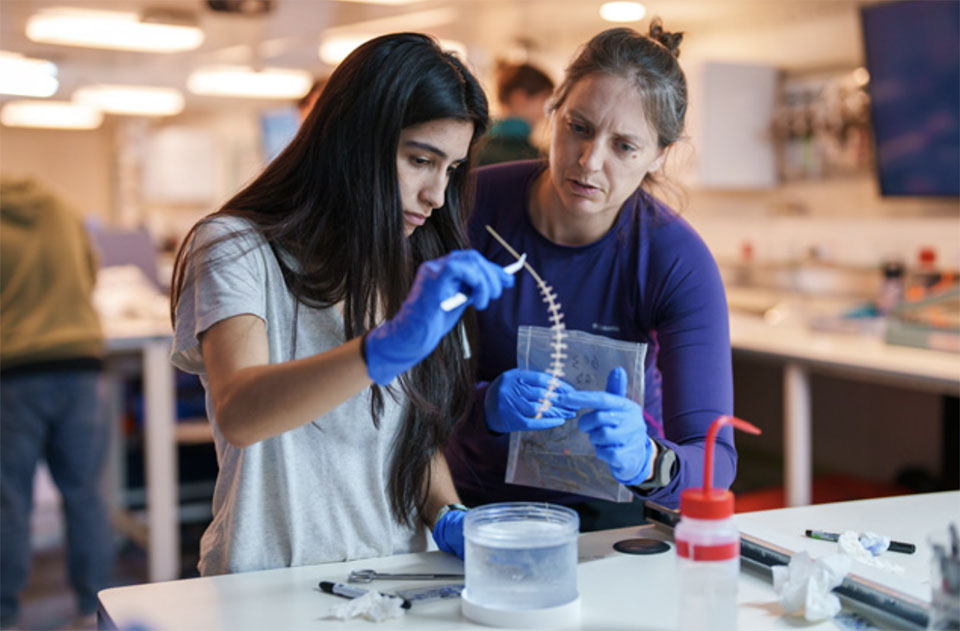By Amanda A. Taylor-Uchoa
RIO GRANDE VALLEY, TEXAS – APRIL 22, 2024 – Elyssia Gonzalez, a grad student pursuing a master’s degree in Ocean, Coast and Earth Sciences, never thought she’d spend her Spring 2024 semester studying never-before-observed sea creatures off the coast of Chile.
But through the help of her advisor, Dr. Erin Easton, she was able to experience that, and much more.
Gonzalez, along with Megan Francis, a UTRGV sophomore pursuing a Bachelor of Science in Marine Biology, experienced a once-in-a-lifetime research opportunity by way of research expedition off the coast of Chile, observing seamounts along the Nazca and Salas y Gomez Ridge.
Gonzalez worked alongside Easton, assistant professor with the UTRGV School of Earth, Environmental and Marine Sciences and scientists aboard the Schmidt Ocean Institute Research vessel, the Falkor (too), during the first of two expeditions from Jan. 8 to Feb. 11.
While Gonzalez and Francis had similar experiences on the Schmidt Ocean Institute research cruises, they were on separate expeditions. Gonzalez joined the first expedition, while Francis was aboard the Falkor (too) during the second expedition, from Feb. 24 to April 4.
SHARPENING HER SKILLS
Gonzalez said the skills she gained during the expedition far surpassed her expectations, and that being able to work with robotics, specifically, provided a fascinating learning experience.
“My greatest takeaway from working on the expedition are the skills I learned from working in the lab with fellow researchers and students,” said Gonzalez, a San Juan native. “Aboard this expedition, I was able to learn various laboratory skills used to preserve specimens retrieved from the remote operated vehicle (ROV), named ‘SuBastian.’”
SuBastian is capable of diving to a depth of 4,500 meters, carrying a suite of sensors and equipment to support scientific data and sample collections. It provided the crew a way to incorporate interactive research, experimentation and technology development during both Schmidt expeditions.
Some of the species Gonzalez was able to observe, with SuBastian’s help, were corals – an organism that has piqued Gonzalez’s interest as a primary focus of study for the future.
“Corals are very important, morphologically diverse organisms. Being able to use this opportunity to have the hands-on lab experience working with corals has been the opportunity of a lifetime,” she said. “Personally, I believe that understanding the corals found in the depths of the ocean is essential for discovering ways to advance coral research all around the world, especially the Valley.”
While coral reefs have always been of interest to Gonzalez, she said her goal is to study and understand the complexity of corals to help contribute to further coral research locally.
“I am honored to have had the opportunity to represent the Valley upon this research cruise,” she said. “I aspire to continue my education by pursuing a PhD and becoming a research scientist.”
HELP THE EARTH THROUGH RESEARCH
April is Earth Month, and one of the best ways to generate awareness, Gonzalez said, is to take every research opportunity available to help preserve our planet.
“As a graduate student, research opportunities come with great importance because it allows students to gain professional development,” she said. “Opportunities like these introduce students to the work field and prepare them for future career opportunities and endeavors.”
Her advice to other students wanting to fulfill research or internship goals is to get connected and search for opportunities.
“I would say to never stop doing your own research, to get connected with professors and other professional researchers,” she said. “Most importantly, stay involved and take time to identify your interests and passions, and don’t be afraid to keep reaching out.”
ABOUT UTRGV
The University of Texas Rio Grande Valley (UTRGV) was created by the Texas Legislature in 2013 as the first major public university of the 21st century in Texas. This transformative initiative provided the opportunity to expand educational opportunities in the Rio Grande Valley, including a new School of Medicine and a School of Podiatry, and made it possible for residents of the region to benefit from the Permanent University Fund – a public endowment contributing support to the University of Texas System and other institutions.
UTRGV has campuses and off-campus research and teaching sites throughout the Rio Grande Valley including Brownsville (formerly The University of Texas at Brownsville campus), Edinburg (formerly The University of Texas-Pan American campus), Harlingen, Weslaco, McAllen, Port Isabel, Rio Grande City and South Padre Island. UTRGV, a comprehensive academic institution, enrolled its first class in the fall of 2015; the School of Medicine welcomed its first class in the summer of 2016, and the School of Podiatric Medicine in the fall of 2022.


